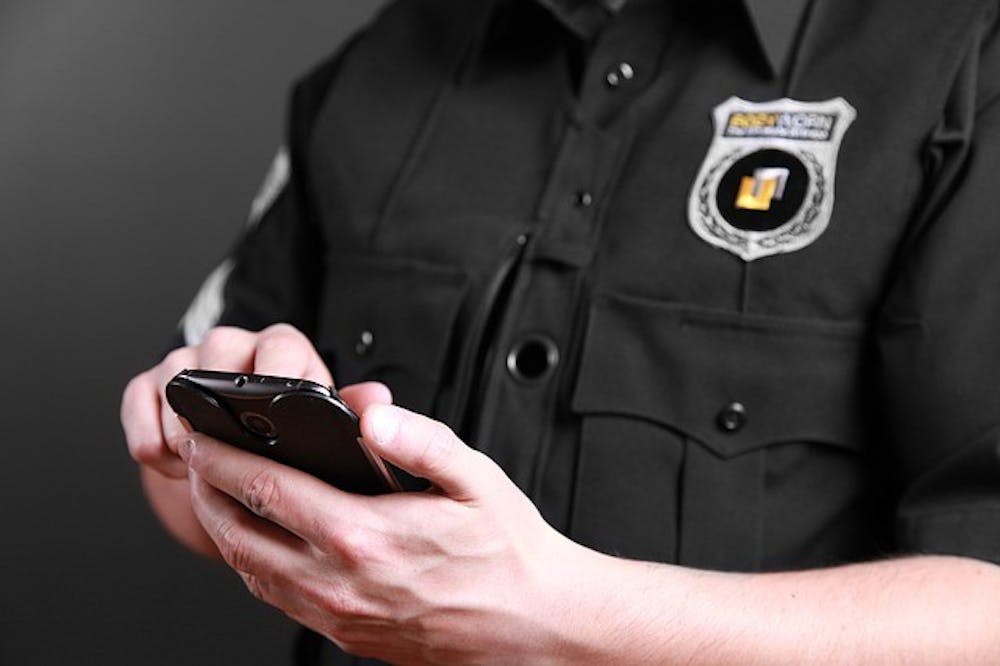In the wake of scrutiny and media coverage over police interactions with minorities, body cameras have emerged as a potential resolution.
The Philadelphia Police Department launched its pilot program using body cameras for its officers in December. At the time, the Division of Public Safety said it was researching the possibility of implementing a program of its own, but was waiting for the PPD pilot to pan out.
Given the Penn Police’s unique scope and patrol area, body cameras could be redundant, Vice President for Public Safety Maureen Rush said. Penn has over 140 pan-tilt cameras covering almost every inch of public space on Penn’s campus. “We aren’t rushing into it because we don’t really need it,” Rush said.
She also pointed out that under Pennsylvania’s strict wire-tapping laws, the police must ask to record before entering any private residences. Still, DPS has been researching body cameras for some time, Rush said, and they will continue to consider it an option in the future.
After the conclusion of its pilot program this March, the PPD is working on the evaluation of the findings, PPD Public Information Officer Lieutenant John Stanford said.
“Once that evaluation is done, the department will make a selection of camera type and system that is most practical,” Stanford said. The department will then make a purchase and start a permanent program.
More than 30 volunteer officers from the PPD’s 22nd district began wearing body cameras in December 2014. They tested cameras from multiple companies, most notably the company Taser, which also produces conductive energy devices. The officer’s reactions have been generally positive. Officer Anthony Case told the Philadelphia Daily News in an article printed on Wednesday, “I thought it was a progressive idea on the department’s behalf. If I go on the street without it, I feel like I’m going back in time a little bit.”
The statistics on body cameras are also, in general, quite positive. One study shows that after the implementation of body cameras, the number of complaints filed against officers dropped from 0.7 complaints per 1,000 contacts to 0.07 complaints per 1,000 contacts. These numbers may seem minuscule, but in terms of real dollar value, approximately four dollars are saved on dealing with complaints for every one dollar spent on cameras.
That said, the purchasing of the cameras, storage space and other necessities represents a huge initial investment. According to the Police Executive Research Forum, most agencies spent between $800 and $1,200 on each camera.
But that doesn’t mean the implementation by Penn Police would necessarily cost a fortune. Police agencies have looked to the federal government for funding. In December of last year, the Obama administration announced a plan to spend $75 million on body cameras alone as part of a $263 million, three-year plan to help improve the nation’s police forces. The caveat is that state and local departments will have to match any funding they receive from the federal government.
Though most programs around the country are still in their early phases, many experts maintain that use of body cameras has the potential to change the way police officers and citizens interact.
Assistant professor of Criminology Charles Loeffler said the adoption of wearable body cameras can be compared to the adoption of other, now standard police equipment such as uniforms in the 19th century or patrol cars in the 20th. Loeffler feels that there is still a lot of research that can be done, and the effectiveness of body cameras will depend on a variety of external factors.
“A lot will depend on the particulars of how body camera programs are implemented and how they are communicated to citizens and rank-and-file officers,” said Loeffler.
Penn Police is not the only agency with hesitations over adopting body cameras. Some officers and policy experts have expressed concerns over the camera’s potential to add yet another level of surveillance on the American people, and extend the infringement of privacy rights.
“We are always concerned when the government, particularly the police, collects large amounts of information about people who aren’t entering the criminal-justice system,” said Mary Catherine Roper — the deputy legal director at the American Civil Liberties Union of Pennsylvania — in the Wednesday Philadelphia Daily News article. “We’re concerned that it not become a bank of ‘suspicious characters’ for police to look through later. They need to be adopted with a lot of caution and care and protections.”
Loeffler feels that the camera’s effects on privacy will again depend heavily on multiple factors. “How citizen privacy will be affected by police cameras will depend a lot on how the technology is used by police departments and how courts balance the interests of the public, the police and the privacy of citizens,” Loeffler said.









